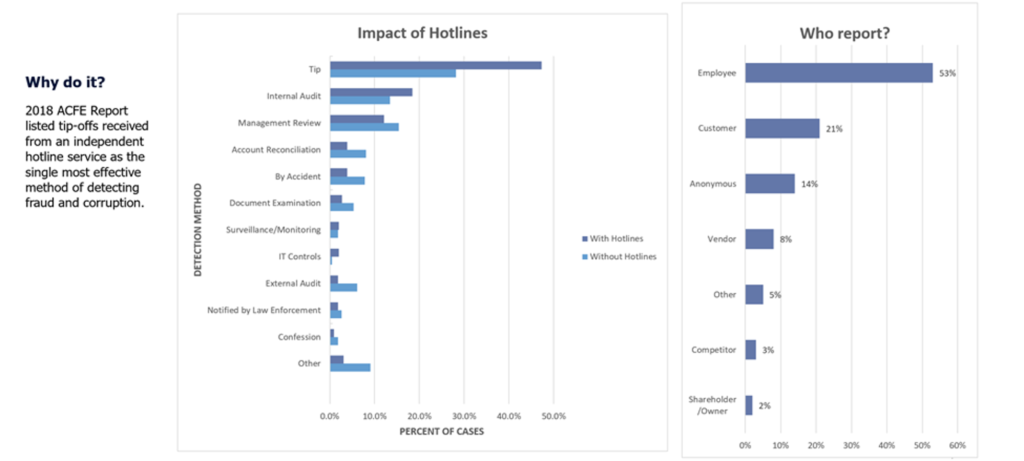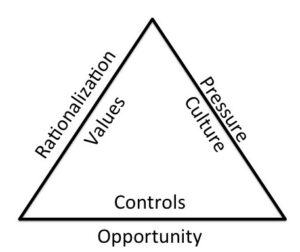Governance and Compliance disclosure (aka: whistle-blower) hotlines are a key component of an effective corporate compliance and ethics program. And, research demonstrates that external independent disclosure hotlines facilitate the detection of unethical or unlawful conduct, as tips are the most pervasive and effective detection method for suspected wrongdoing in companies with or without hotlines.
In companies with such a formal hotline, account for about 60% of all fraud detection versus only one-third of detection in companies with no hotline. Notably, the rate of discovering fraud “by accident” more than doubles when a company fails to offer a hotline.[1] Please see the graphic below based on the latest report from the Association of Certified Fraud Examiners:

Therefore, companies should review their internal compliance and for prompt identification and redress of suspected unethical or unlawful acts and provide management with the necessary tools to resolve such acts internally.
To help facilitate an effective whistle-blower hotline and reporting program, boards of directors and management should consider the following:
Anonymity and confidentiality: Employees should be able to make whistle-blower tips anonymously or, at the very least, confidentially, as research indicates that employees are more comfortable reporting suspected wrongdoing when such options are available. In 2016, 60% of internal fraud tips were reported anonymously.[2] Anonymous and confidential reporting mechanisms help foster a climate whereby company employees are more likely to report or seek guidance regarding potential or actual wrongdoing without fear of retaliation.

Ensure confidence of no retaliation: Companies must emphasize when publicizing hotline reporting procedures that they will not and are prohibited by law from retaliating against employees who make whistle-blower reports. The fear of retribution is generally strong among potential whistle-blowers and such fear may adversely affect the effectiveness of the internal reporting process. Trust in a company’s whistle-blower processes, including making hotline reports without fear of retaliation, is essential to motivate employees to report suspected unethical or unlawful conduct internally. Further, in addition to the whistle-blower anti-retaliation protections found in a number of federal statutes, most states also provide related protections that may apply.
Potential incentives: Companies could offer financial as well as non-financial reporting incentives, such as cash rewards or extra vacation days, for whistle-blower reports that lead the company to identify suspected unethical or unlawful activity. Although the percentage of companies offering rewards for internal whistle-blowers is estimated to be approximately 10%, external incentives (such as the SEC Whistle-blower Program’s financial rewards) may motivate employees to first report outside the organization.[3] A company may minimize external incentives by offering its own reporting programs, including hotlines, as well as their internal investigation procedures, and consider initiatives (e.g., a training program that identifies the areas that pose the most risks to the company) that actively promote those programs (emphasizing confidentiality and non-retaliation), simplify reporting procedures and attempt to make related policies more accessible and easy to understand. A company’s hotline policy should be a clear, well-communicated written policy that allows reward/compensation system to internal whistle-blowers for tips that identify unethical conduct, fraud and waste and those that save the company resources, for example, through workplace safety and process improvements.
Tone at the top: The DOJ has issued numerous DPAs, citing that companies are required to prove that their directors, are setting the “all-important ‘tone at the top’ for the entire company.”[ensuring] that its directors and senior management provide strong, explicit, and visible support and commitment to its corporate policy against violations of the anti-corruption laws and its compliance code”.[4]

Creating a culture in which internal reporting is valued and where tipsters are protected is essential to preventing and detecting suspected unethical or unlawful conduct. A positive tone from the top of a company may ease the stigma of utilizing a company hotline, making employees feel less intimidated when they decide whether to report to the internal hotline in the future. Also, a board’s or management’s effective and expeditious response to hotline calls will help facilitate communicating a proper message to employees so they do not lose faith in the board or management and feel as though their only option is to report suspected wrongdoing to regulators. Further, senior management should praise whistle-blowers who first report suspected unethical or unlawful conduct internally (versus to regulators) to reinforce that such action is encouraged and supported.
Educate, publicize and make hotline available: Companies should ensure that their compliance and ethics programs include recurrent educating of employees on and publicizing the who-what-when-where-why-how of reporting suspected unethical or unlawful activity via the company’s whistle-blower hotline.
Further, companies should make hotlines available 24 hours a day and 365 days a year. Employees may feel more comfortable reporting suspected wrongdoing outside of normal work hours to preserve anonymity.
Record and analyze statistics: Companies should use their hotlines as a tool for collecting and analyzing information on the company’s overall internal compliance, reporting and ethics program. Data a company receives in connection with its whistle-blower hotline should be reviewed by management with board oversight to monitor, among other metrics, the rate of employee hotline use, the company’s record of following up on tips, whether claims are substantiated and the departments that are most frequently implicated in the reports.
Such analysis is also useful to benchmark their compliance programs to internal (e.g., location, business units and departments) and external (e.g., peers and industry) data sources. Company data is often available by way of its internal or third-party hotline database, while peer and industry hotline data may be purchased from third-party providers. Hotline data bench-marking provides companies with comparative information to determine reporting patterns that are higher than, lower than or in line with peers and their industry, which information may suggest mistrust or misuse of the whistle-blower hotline or be indicative of more serious company-wide compliance and ethics issues.
Hotline managed by third-party provider: Whistle-blower hotlines should be managed by independent third-party providers which should be well publicized to its employees. Employees tend to trust independently managed more than internally maintained hotlines. Further, third-party providers generally have more experience in managing whistle-blower calls and may provide company boards and management with insightful hotline data, reports and analyses of the effectiveness of the hotline.
Allow multiple methods for submitting tips: Employees should be allowed to submit whistle-blower tips in multiple forms such as mail, a designated website and a dedicated phone line. Depending on a number of factors (e.g., location, educational background, age and level of employment), employees may differ on their preferred method of reporting compliance concerns.
Evaluate, test and audit Hotlines: Whether managed internally or outsourced to a third party, should be evaluated, tested and audited to ensure that the manner in which hotline calls are received, recorded and managed is consistent, confidential, accurate and timely, and that the hotline is operating as intended by the board and management.
Educate other stakeholders and grant access to hotline: Companies should expand training and dissemination of educational materials relating to their compliance and ethics program to include not only employees, but also other company stakeholders (such as vendors) and agents. Regularly educating other stakeholders and agents on the who-what-when-where- why-how of reporting suspected wrongdoing by way of the company’s hotline may prove beneficial to the company through an increased number of substantiated hotline reports.
The quality of a company’s internal compliance and reporting programs and how effectively they are communicated to employees may significantly impact whether a whistle-blower first reports internally or approaches a regulator. An effective whistle-blower hotline is a good corporate governance practice, is essential to a company’s successful corporate compliance program and in turn, the company’s long- term success, and helps ensure that a silent hotline reflects the effectiveness of a company’s compliance and ethics efforts and is not an indication of something more ominous.
For more information on best practices in further developing your company’s governance framework, governance policies or building a more effective hotline, please connect with us at: mds@govenance-solutions.com or +852 5240 0840 / +86 139 1147 0721.
[1] Report to the Nations on Occupational Fraud and Abuse, 2018 Global Fraud Study.
[2] The 2016 Ethics and Compliance Hotline Benchmark Report, Deloitte Forensic (March 2016).
[3] Report to the Nations on Occupational Fraud and Abuse, 2016 Global Fraud Study.
[4] DPA (Deferred Prosecution Agreement) – US District Court for the Southern District of Florida v. Embraer S.A. Case no. 16-60294-cr-cohn, p.43 October 24, 2016